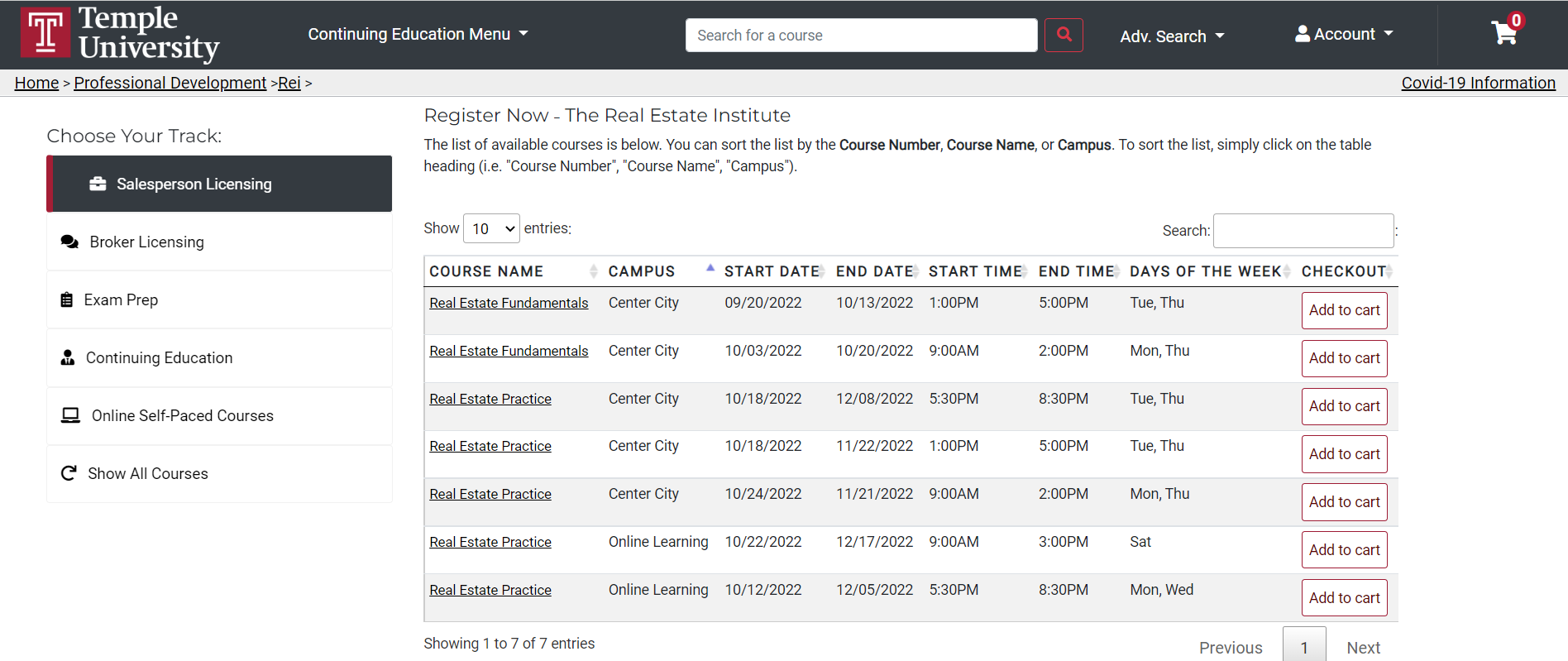
It is not easy to become a licensed New York real estate agent. Depending on your age and your previous education, the process can take as little as six weeks or as long as four months. In addition, you will need to complete a 75-hour pre-licensing course and pass a state-approved test. You can choose to enroll in either an online or classroom program.
The New York Department of State lists approved training providers and courses. You can learn online in your own pace and you will receive study materials. This means that you won't need to miss any class. If you opt for an in-person program you will most likely spend the day sitting in a classroom. Some brokers offer mentoring and technology to help you get a head start.
New York State's real estate exam is a 75 question multiple-choice test you must pass to get your license. It's available in English as well French, Spanish, Mandarin and Spanish. A certificate of completion will be presented to you after you have successfully completed the course. You also receive a copy proving your score. While passing this exam may be difficult for first timers, you are unlikely to fail the same test twice.

It is probably not a good idea for someone who is still working to apply for a license. You will need to present a government-issued photo identification. A background check can take up to weeks.
New York's residential real estate market is undoubtedly one of the most lucrative in the country. Apart from a great salary, you'll also have the opportunity witness the best moments in the life of your clients. Access to a wide range of tools that can help you find your clients and make introductions faster will also be a benefit.
It is important to remember that you are not alone in your quest to become a real-estate agent. Many people do not complete the entire process because they don't know what to do. Luckily, the Department of State has a helpful e-guide, or e-book if you're feeling ambitious, to guide you through the maze of paperwork. Once your application is approved, you can begin working for a brokerage and earning your commission.
A broker with a proven track record is one of the best ways you can learn about the field. Your new broker should offer mentoring opportunities and a commission rate that is competitive with the competition. A good tip is to find a company that offers many services, such property management, so that you can specialize in one area.

To obtain a New York Real Estate License, you must take 75-hours of pre-licensing training, pass a state test, apply, get your background checked, and submit your application. Although these steps can be daunting, the results are well worth it.
FAQ
What should I look out for in a mortgage broker
A mortgage broker is someone who helps people who are not eligible for traditional loans. They look through different lenders to find the best deal. Some brokers charge fees for this service. Others offer free services.
What are the three most important factors when buying a house?
The three main factors in any home purchase are location, price, size. The location refers to the place you would like to live. The price refers to the amount you are willing to pay for the property. Size refers to the space that you need.
Can I buy my house without a down payment
Yes! Yes. These programs include government-backed loans (FHA), VA loans, USDA loans, and conventional mortgages. Check out our website for additional information.
How many times do I have to refinance my loan?
This depends on whether you are refinancing with another lender or using a mortgage broker. In both cases, you can usually refinance every five years.
Is it better for me to rent or buy?
Renting is typically cheaper than buying your home. It's important to remember that you will need to cover additional costs such as utilities, repairs, maintenance, and insurance. You also have the advantage of owning a home. You'll have greater control over your living environment.
What are the benefits associated with a fixed mortgage rate?
A fixed-rate mortgage locks in your interest rate for the term of the loan. This ensures that you don't have to worry if interest rates rise. Fixed-rate loans come with lower payments as they are locked in for a specified term.
How can you tell if your house is worth selling?
If your asking price is too low, it may be because you aren't pricing your home correctly. You may not get enough interest in the home if your asking price is lower than the market value. You can use our free Home Value Report to learn more about the current market conditions.
Statistics
- This means that all of your housing-related expenses each month do not exceed 43% of your monthly income. (fortunebuilders.com)
- This seems to be a more popular trend as the U.S. Census Bureau reports the homeownership rate was around 65% last year. (fortunebuilders.com)
- When it came to buying a home in 2015, experts predicted that mortgage rates would surpass five percent, yet interest rates remained below four percent. (fortunebuilders.com)
- 10 years ago, homeownership was nearly 70%. (fortunebuilders.com)
- It's possible to get approved for an FHA loan with a credit score as low as 580 and a down payment of 3.5% or a credit score as low as 500 and a 10% down payment.5 Specialty mortgage loans are loans that don't fit into the conventional or FHA loan categories. (investopedia.com)
External Links
How To
How to manage a rental property
Renting your home can be a great way to make extra money, but there's a lot to think about before you start. We'll help you understand what to look for when renting out your home.
Here are some things you should know if you're thinking of renting your house.
-
What factors should I first consider? Before you decide if you want to rent out your house, take a look at your finances. You may not be financially able to rent out your house to someone else if you have credit card debts or mortgage payments. Also, you should review your budget to see if there is enough money to pay your monthly expenses (rent and utilities, insurance, etc. It may not be worth it.
-
How much does it cost for me to rent my house? It is possible to charge a higher price for renting your house if you consider many factors. These factors include the location, size and condition of your home, as well as season. It's important to remember that prices vary depending on where you live, so don't expect to get the same rate everywhere. Rightmove shows that the median market price for renting one-bedroom flats in London is approximately PS1,400 per months. This means that if you rent out your entire home, you'd earn around PS2,800 a year. That's not bad, but if you only wanted to let part of your home, you could probably earn significantly less.
-
Is it worthwhile? There are always risks when you do something new. However, it can bring in additional income. Be sure to fully understand what you are signing before you sign anything. Renting your home won't just mean spending more time away from your family; you'll also need to keep up with maintenance costs, pay for repairs and keep the place clean. You should make sure that you have thoroughly considered all aspects before you sign on!
-
What are the benefits? There are benefits to renting your home. You have many options to rent your house: you can pay off debt, invest in vacations, save for rainy days, or simply relax from the hustle and bustle of your daily life. Whatever you choose, it's likely to be better than working every day. If you plan ahead, rent could be your full-time job.
-
How can I find tenants? Once you've decided that you want to rent out, you'll need to advertise your property properly. You can start by listing your property online on websites such as Rightmove and Zoopla. Once potential tenants reach out to you, schedule an interview. This will enable you to evaluate their suitability and verify that they are financially stable enough for you to rent your home.
-
How can I make sure I'm covered? If you fear that your home will be left empty, you need to ensure your home is protected against theft, damage, or fire. You'll need to insure your home, which you can do either through your landlord or directly with an insurer. Your landlord will often require you to add them to your policy as an additional insured. This means that they'll pay for damages to your property while you're not there. However, this doesn't apply if you're living abroad or if your landlord isn't registered with UK insurers. In such cases you will need a registration with an international insurance.
-
If you work outside of your home, it might seem like you don't have enough money to spend hours looking for tenants. You must put your best foot forward when advertising property. Make sure you have a professional looking website. Also, make sure to post your ads online. You'll also need to prepare a thorough application form and provide references. Some people prefer to do everything themselves while others hire agents who will take care of all the details. Either way, you'll need to be prepared to answer questions during interviews.
-
What should I do after I have found my tenant? If you have a current lease in place you'll need inform your tenant about changes, such moving dates. You can negotiate details such as the deposit and length of stay. You should remember that although you may be paid after the tenancy ends, you still need money for utilities.
-
How do you collect the rent? When it comes time for you to collect your rent, check to see if the tenant has paid. If they haven't, remind them. Any outstanding rents can be deducted from future rents, before you send them a final bill. If you're struggling to get hold of your tenant, you can always call the police. The police won't ordinarily evict unless there's been breach of contract. If necessary, they may issue a warrant.
-
How can I avoid potential problems? Renting out your house can make you a lot of money, but it's also important to stay safe. Ensure you install smoke alarms and carbon monoxide detectors and consider installing security cameras. Also, make sure you check with your neighbors to see if they allow you to leave your home unlocked at night. You also need adequate insurance. Finally, you should never let strangers into your house, even if they say they're moving in next door.